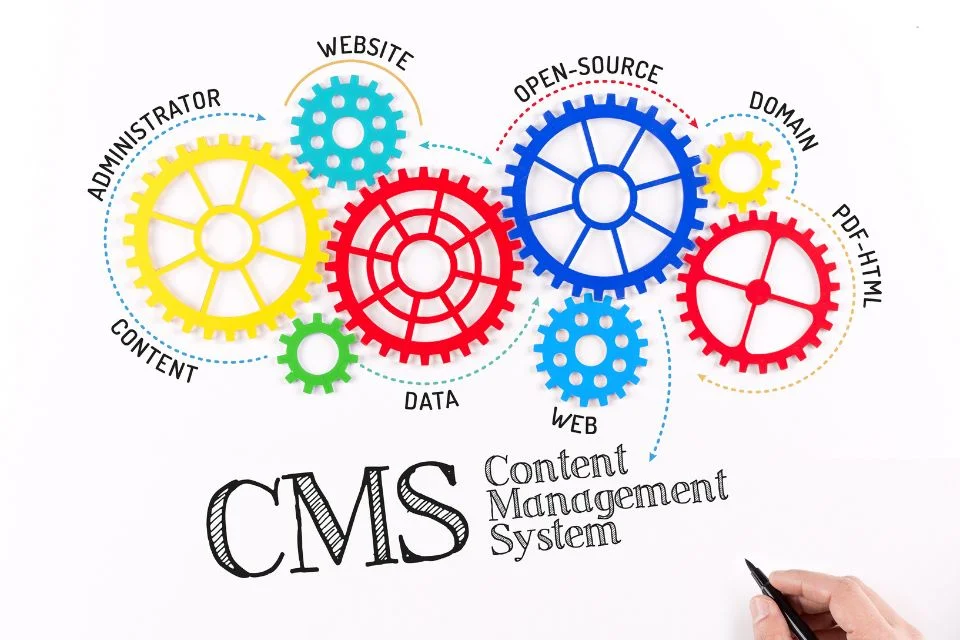Content management systems
Content management systems (CMS) are digital tools that support your entire team by streamlining the process of publishing, storing, and retrieving content. In other words, a CMS helps you manage the flow of information so everyone is working from the same set of standards, and version control is implemented throughout all digital assets. A Content Management System (CMS) is a website management system that allows users to manage website content like text, images, videos, etc. The primary purpose of a CMS is to reduce the time and effort needed to maintain websites by simplifying common tasks like adding and editing content. In this blog post, we’ll explore five well-known CMS options that are best suited for small businesses with limited resources.
1. WordPress
As one of the most popular options out there, WordPress is a robust CMS that’s easy to use. In fact, it’s so straightforward, you don’t need to be a website developer to utilize its complete feature set and functionality. There are two primary types of WordPress websites: – Blogs – these are sites whose main focus is publishing articles and other content on a regular basis – Websites – these are online destinations with a diverse range of content types and sections Both of these are very effective for small businesses and are simple to set up and administer thanks to WordPress’s user-friendly interface.
2. Drupal
Drupal is an extremely robust CMS that’s built to meet the needs of large organizations. However, its functionality and user-friendliness also make it a fantastic choice for SMBs looking for a highly scalable solution. Drupal websites are unique in that they don’t actually have one main homepage. Instead, they have a series of “pages” that cover all aspects of your business and organizational goals. Drupal is a very flexible system, and it can be configured to meet almost any content or functionality need. It’s also highly scalable, which means it’s easy to upgrade and extend as your business grows. Drupal is free and open source, making it an excellent solution for businesses on a tight budget.
3. Squarespace
Squarespace is a simple but powerful CMS that’s designed for small businesses and organizations. This CMS solution is designed to be user-friendly and makes it easy to get your website online and start publishing content. Squarespace is a fully hosted solution, which means that you don’t have to worry about managing IT infrastructure or dealing with hosting. All you have to do is sign up for a plan, and you’ll have a fully functioning website that you can manage yourself. Squarespace includes a wide range of features that can be used to manage and publish content; everything from blogging and eCommerce options to a fully functioning CRM. Squarespace is a great solution for SMBs that are looking for an all-in-one publishing platform that doesn’t require any technical knowledge to use.
4. HubSpot CMS
HubSpot CMS is a robust, feature-packed CMS solution that’s designed to help you manage and market your organization’s website with ease. HubSpot is a fully managed platform, which means that you have access to a wide range of tools that can be used to automate almost every aspect of your digital marketing strategy. HubSpot CMS is a hosted solution, so you don’t have to worry about managing or maintaining an IT infrastructure. On the other hand, you do have to pay a monthly hosting fee. HubSpot CMS is a good option for SMBs that are looking for a fully integrated digital marketing tool that takes care of all website publishing needs.
5. TinyMCE
TinyMCE is an open-source content management system designed to be easy to use and integrate with various systems and tools. TinyMCE is a server-side solution, which means that it runs on a server rather than on a client machine. It also means that it isn’t a full-fledged CMS – it only provides basic functionality such as text editing. TinyMCE is free to use, and it’s an excellent option for businesses that are looking for a simple way to manage content on their website. TinyMCE is easy to install and use, and it doesn’t require any special technical knowledge to operate.
Conclusion
Now that you know what content management systems are, and which five options are best suited for small businesses, it’s time to sign up for a plan and get started! No matter which CMS you choose, you’ll be able to manage your content with ease and have a fully functional website up and running in no time. Plus, you’ll be able to scale and adapt as your business grows, too. Ultimately, the CMS you choose should reflect the needs and goals of your organization. While there are a variety of different options available, it’s important to select a system that’s best suited for your business type.






